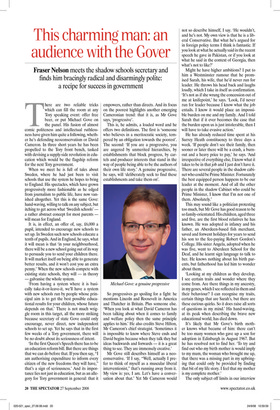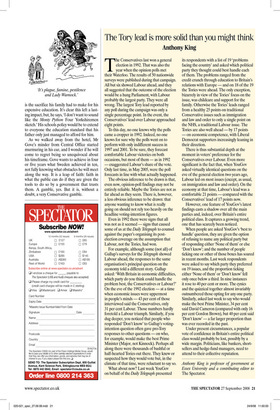This charming man: an audience with the Gover
Fraser Nelson meets the shadow schools secretary and finds him bracingly radical and disarmingly polite: a recipe for success in government There are two reliable tricks which can fill the room at any Tory speaking event: offer free beer, or put Michael Gove on the panel. His fusion of almost comic politeness and intellectual ruthlessness have given him quite a following, whether he’s defending neoconservatism or David Cameron. In three short years he has been propelled to the Tory front bench, tasked with devising a supply-side revolution in education which would be the flagship reform for the next Tory government.
When we meet he is full of tales about Sweden, where he had just been to visit schools that use the system he hopes to bring to England. His spectacles, which have grown progressively more fashionable as he edged from journalism to public life, have now vanished altogether. Yet this is the same Gove: hand-waving, willing to talk on any subject, but itching to get across what ‘Swedish schools’ — a rather abstract concept for most parents — will mean for England.
It is, in effect, an offer of, say, £6,000 a pupil, intended to encourage new schools to set up. In Sweden such new schools educate a tenth of pupils. And in England, he says, what it will mean is that ‘in your neighbourhood, there will be a new school going out of its way to persuade you to send your children there. It will market itself on being able to generate better results, and it won’t cost you an extra penny.’ When the new schools compete with existing state schools, they will — in theory — galvanise the whole system.
‘From having a system where it is basically take-it-or-leave-it, we’ll have a system with new schools run by people whose principal aim is to get the best possible educational results for your children, whose future depends on that.’ There is not much wriggle room in this target, all the more striking because secretary of state Gove could only encourage, never direct, new independent schools to set up. Yet he says that in the first few weeks of a Tory government, there will be no doubt about its seriousness of intent.
‘In the first Queen’s Speech there has to be an education reform bill. But there are things that we can do before that. If you then say, “I am authorising expenditure to inform every citizen of the new freedoms they will have,” that’s a sign of seriousness.’ And its importance lies not just in education, but as an allegory for Tory government in general: that it empowers, rather than directs. And its focus on the poorest highlights another emerging Cameronian trend: that it is, as Mr Gove says, ‘progressive’.
This is, he admits, a loaded word and he offers two definitions. The first is ‘someone who believes in a meritocratic society, tempered by an obligation towards the poorest’. The second: ‘If you are a progressive, you are angered by unmerited hierarchies, by establishments that block progress, by cartels and producer interests that stand in the way of people being able to be the authors of their own life story.’ A genuine progressive, he says, will ‘deliberately seek to find these establishments and take them on’.
So progressives go spoiling for a fight: he mentions Lincoln and Roosevelt in America and Thatcher in Britain. Plus someone else. ‘When you look at what David Cameron has been talking about when it comes to family and welfare policy then the same principle applies to him.’ He also credits Steve Hilton, Mr Cameron’s chief strategist. ‘Sometimes it is impossible to know where Steve ends and David begins because when they talk they bat ideas backwards and forwards — it is a great thing to see. They are immensely creative.’ Mr Gove still describes himself as a neoconservative. ‘If I say, “Well, actually I prefer to think of myself as a muscular liberal interventionist,” that’s running away from it. My view is: yes, I am. Let’s have a conversation about that.’ Yet Mr Cameron would not so describe himself, I say. ‘He wouldn’t, and he’s not. My own view is that he is a liberal Conservative. But what he’s argued for in foreign policy terms I think is fantastic. If you look at what he actually said in the recent speech he gave in Pakistan, or if you look at what he said in the context of Georgia, then what’s not to like?’ Might he have higher ambitions? I put to him a Westminster rumour that he promised Sarah, his wife, that he’d never run for leader. He throws his head back and laughs loudly, which I take in itself as confirmation. ‘It’s not as if she wrung the concession out of me at knifepoint,’ he says. ‘Look, I’d never run for leader because I know what the job entails. I know it would place an impossible burden on me and my family. And I told Sarah that if it ever becomes the case that the burden upon us is just intolerable, then I will have to take evasive action.’ He has already reduced time spent at his Surrey Heath constituency to three days a week. ‘If people don’t see their family, then sooner or later there will be a crash, a burnout and a heavy price to pay,’ he says. ‘And irrespective of everything else, I know what it takes to be in that job and I just don’t have it. There are several people in the shadow cabinet who could be Prime Minister. Fortunately the best equipped person happens to be our leader at the moment. And of all the other people in the shadow Cabinet who could be Prime Minister, I know that I’m not one of them. Absolutely.’ This may sound like a politician protesting too much, but Mr Gove has good reason to be so family-orientated. His children, aged three and five, are the first blood relatives he has known. He was adopted in infancy and his father, an Aberdeen-based fish merchant, saved and forwent holidays for years to send his son to the fee-paying Robert Gordon’s College. His sister Angela, adopted when he was five, went to Aberdeen School for the Deaf, and he learnt sign language to talk to her. He knows nothing about his birth parents, but fatherhood has led him to wonder about them.
‘Looking at my children as they develop, I see certain traits and wonder where they come from. Are there things in my ancestry, in my genes, which I see reflected in them and their behaviour? I can recognise my traits, certain things that are Sarah’s, but there are these curious quirks. So it does raise all sorts of questions in my mind.’ His hand-waving, at its peak when describing the brave new educational world, has died down.
It’s likely that Mr Gove’s birth mother knows what became of him: there can’t be too many women who gave up a son for adoption in Edinburgh in August 1967. But he has resolved not to find her. ‘To try and find out who my birth mother is would imply to my mum, the woman who brought me up, that there was a missing part in my upbringing that could only be provided by finding that bit of my life story. I feel that my mother is my complete mother.’ The only subject off limits in our interview is the sacrifice his family had to make for his expensive education. It’s clear this left a lasting impact, but, he says, ‘I don’t want to sound like the Monty Python Four Yorkshiremen sketch.’ His schools policy would be to extend to everyone the education standard that his father only just managed to afford for him.
As we walked away from the hotel, Mr Gove’s minder from Central Office started murmuring in his ear, and I wonder if he will come to regret being so unequivocal about his timeframe. Gove wants to achieve in four or five years what Sweden achieved in ten, not fully knowing what obstacles he will meet along the way. It is a leap of faith: faith in what the public can do if they are given the tools to do so by a government that trusts them. A gamble, yes. But it is, without a doubt, a very Conservative gamble.











































































 Previous page
Previous page